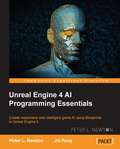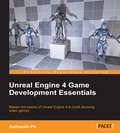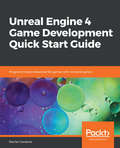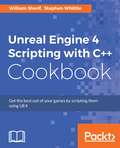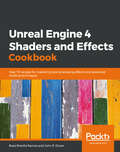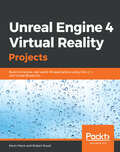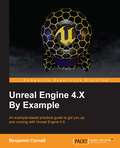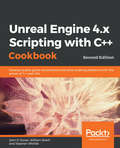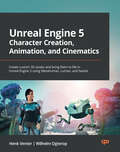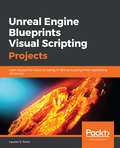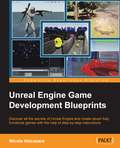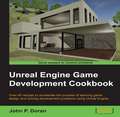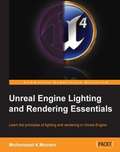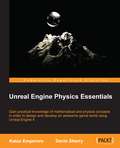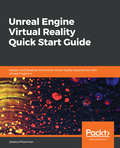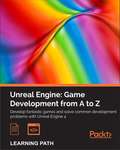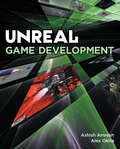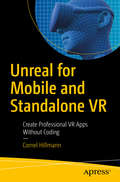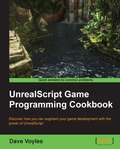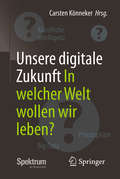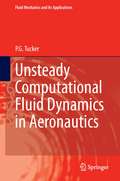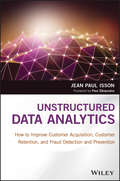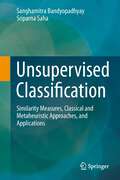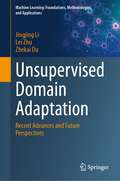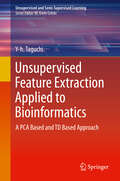- Table View
- List View
Unreal Engine 4 AI Programming Essentials
by Jie Feng Peter L. NewtonCreate responsive and intelligent game AI using Blueprints in Unreal Engine 4 About This Book * Understand and apply your Game AI better through various projects such as adding randomness and probability, and introducing movement * Configure and debug Game AI logic using multiple methodologies * Bridge the gap between your knowledge and Game AI in Unreal Engine 4 Who This Book Is For This book is for programmers and artists who want to expand their knowledge of Game AI in relation to Unreal Engine 4. You are recommended to have some experience of exploring Unreal Engine 4 prior to this book because we jump straight into Game AI. What You Will Learn * Understand the fundamental components of Game AI within Unreal Engine 4 * Skillfully introduce Game AI within Unreal Engine 4 * Configure, customize, and assign Navigation and AI components to your pawn * Create, debug, and analyze Game AI behavior * Design responsive Game AI using the Behavior Tree methodology * Create smart objects designed to interact with AI * Utilize advanced AI features within your project to maximize the user experience In Detail Unreal Engine is a powerful game development engine that provides rich functionalities to create 2D and 3D games. It is one of the three big game engines used, alongside Unity and CryEngine. Developers have the opportunity to build cross-platform mobile and desktop games from scratch. With Blueprints in Unreal Engine 4, you're able to fully leverage the visual aid that Behavior Trees are built on. Rarely has there been an opportunity to prototype powerful Game AI and have immediate control over constructing, scripting, and viewing the response in a live gaming environment. This book will show you how to apply artificial intelligence (AI) techniques to your Unreal Script using C++ as your scripting language through multiple projects. With the knowledge gained through this book, you'll be able to leverage the benefits of Unreal Engine 4. We'll start with an introduction to AI, and you'll learn how it is applied to gaming. Then you'll jump right in and create a simple AI bot and apply basic behaviors to allow it to move randomly. Furthermore, you will get to know the difference between an AI Controller and a Player Controller. As you progress, you'll find out how to implement randomness and probability traits. Using Navmesh, we will impart navigation components such as Character Movement, MoveTo Nodes, Settings, and World Objects, and implement behavior trees. You will see different techniques to sense the environment and create your own sensory system, and will implement Steering Behaviors, Path Following, Avoidance, and Projectiles. At the end of the book, we will troubleshoot any issues that might crop up while building the entire game. Style and approach This easy-to-follow project-based guide throws you directly into the excitement of Game AI in an approachable and comprehensive manner.
Unreal Engine 4 Game Development Essentials
by Satheesh PvMaster the basics of Unreal Engine 4 to build stunning video games About This Book * Get to grips with the user interface of Unreal Engine 4 and find out more about its various robust features * Create dream video games with the help of the different tools Unreal Engine 4 offers * Create video-games and fully utilize the power of Unreal Engine 4 to bring games to life through this step-by-step guide Who This Book Is For If you have a basic understanding of working on a 3D environment and you are interested in video game development, then this book is for you. A solid knowledge of C++ will come in handy. What You Will Learn * Download both the binary and source version of Unreal Engine 4 and get familiar with the UI * Get to know more about the Material Editor and how it works * Add a post process to the scene and alter it to get a unique look for your scene * Acquaint yourself with the unique and exclusive feature of Unreal Engine 4--Blueprints * Find out more about Static and Dynamic lighting and the difference between various lights * Use Matinee to create cut scenes * Create a health bar for the player with the use of Unreal Motion Graphics (UMG) * Get familiar with Cascade Particle Editor In Detail Unreal Engine 4 is a complete suite of game development tools that gives you power to develop your game and seamlessly deploy it to iOS and Android devices. It can be used for the development of simple 2D games or even stunning high-end visuals. Unreal Engine features a high degree of portability and is a tool used by many game developers today. This book will introduce you to the very popular Unreal 4 engine with hands-on instructions to build stunning video games. You will begin by creating a new project or prototype by learning the essentials of Unreal engine, then you'll get an understanding of how the World Browser can help to improve performance of our game. Next, we'll create a level of detailed models and materials to further improve performance. After that, you'll see how to import textures, create different materials, and see what materials can do in terms of post-processing. Finally, you will get acquainted with the Paper2D tool and the blueprints system to further increase our project's performance with Engine's scalability tools. Style and approach This step-by-step guide will help you gain practical knowledge about Unreal Engine through detailed descriptions of all the tools offered by Unreal Engine.
Unreal Engine 4 Game Development Quick Start Guide: Programming professional 3D games with Unreal Engine 4
by Rachel CordoneLearn how to use Unreal Engine 4 by building 3D and multiplayer games using BlueprintsKey FeaturesLearn the fundamentals of Unreal Engine such as project templates, Blueprints, and C++Learn to design games; use UMG to create menus and HUDs, and replication to create multiplayer gamesBuild dynamic game elements using Animation Blueprints and Behavior TreesBook DescriptionUnreal Engine is a popular game engine for developers to build high-end 2D and 3D games.This book is a practical guide, starting off by quickly introducing you to the Unreal Engine 4 (UE4) ecosystem. You will learn how to create Blueprints and C++ code to define your game's functionality. You will be familiarized with the core systems of UE4 such as UMG, Animation Blueprints, and Behavior Trees. You will also learn how to use replication to create multiplayer games. By the end of this book, you will have a broad, solid knowledge base to expand upon on your journey with UE4.What you will learnUse project templates to give your game a head startCreate custom Blueprints and C++ classes and extend from Epic's base classesUse UMG to create menus and HUDs for your gameCreate more dynamic characters using Animation BlueprintsLearn how to create complex AI with Behavior TreesUse replication to create multiplayer gamesOptimize, test, and deploy a UE4 projectWho this book is forReaders who already have some game development experience and Unity users who would like to try UE4 will all benefit from this book. Knowledge of basic Object-Oriented Programming topics such as variables, functions, and classes is assumed.
Unreal Engine 4 Scripting with C++ Cookbook
by William Sherif Stephen WhittleGet the best out of your games by scripting them using UE4 About This Book * A straightforward and easy-to-follow format * A selection of the most important tasks and problems * Carefully organized instructions to solve problems efficiently * Clear explanations of what you did * Solutions that can be applied to solve real-world problems Who This Book Is For This book is intended for game developers who understand the fundamentals of game design and C++ and would like to incorporate native code into the games they make with Unreal. They will be programmers who want to extend the engine, or implement systems and Actors that allow designers control and flexibility when building levels. What You Will Learn * Build function libraries (Blueprints) containing reusable code to reduce upkeep * Move low-level functions from Blueprint into C++ to improve performance * Abstract away complex implementation details to simplify designer workflows * Incorporate existing libraries into your game to add extra functionality such as hardware integration * Implement AI tasks and behaviors in Blueprints and C++ * Generate data to control the appearance and content of UI elements In Detail Unreal Engine 4 (UE4) is a complete suite of game development tools made by game developers, for game developers. With more than 100 practical recipes, this book is a guide showcasing techniques to use the power of C++ scripting while developing games with UE4. It will start with adding and editing C++ classes from within the Unreal Editor. It will delve into one of Unreal's primary strengths, the ability for designers to customize programmer-developed actors and components. It will help you understand the benefits of when and how to use C++ as the scripting tool. With a blend of task-oriented recipes, this book will provide actionable information about scripting games with UE4, and manipulating the game and the development environment using C++. Towards the end of the book, you will be empowered to become a top-notch developer with Unreal Engine 4 using C++ as the scripting language. Style and approach A recipe based practical guide to show you how you can leverage C++ to manipulate and change your game behavior and game design using Unreal Engine 4.
Unreal Engine 4 Shaders and Effects Cookbook: Over 70 recipes for mastering post-processing effects and advanced shading techniques
by John P. Doran Brais Brenlla RamosBuild optimized, efficient, and real-time applications that are production-ready using Unreal Engine s Material EditorKey FeaturesCreate stunning visual effects for 3D games and high-quality graphicsDesign efficient Shaders for mobile platforms without sacrificing their realismDiscover what goes into the structure of Shaders and why lighting works the way it doesBook DescriptionUnreal Engine 4 is a powerful game engine, one which has seen a recent boost in widespread adoption thanks to its ease of use and the powerful rendering pipeline that it packs. Seeing as how it's relatively easy to create stunning presentations and visuals, Unreal has quickly become a strong contender in industries where this kind of software had been previously denied entry. With that in mind, this book aims to help you get the most out of Unreal Engine 4 - from creating awe-inspiring graphics to delivering optimized experiences to your users. This is possible thanks to a mixture of hands-on experience with real materials and the theory behind them. You will immediately know how to create that material that you want to display, and you'll also end up with the knowledge that will let you know how to control it. All of this will be done without losing sight of two key components of any real-time application - optimization, and efficiency. The materials that you create will be light and efficient, and they will vary depending on your target platform. You'll know which techniques can be used in any kind of device and which ones should be kept to high-end machines, giving you the confidence to tackle any material-related task that you can imagine. Hop onboard and discover how!What you will learnMaster Unreal Engine s rendering pipeline for developing real-time graphicsUse physically based rendering (PBR) for building materials and lighting solutionsBuild optimized materials for games targeting multiple platformsUnderstand Unreal Engine s node and functions for creating desirable effectsDesign and build production-ready shadersExplore Unreal Engine s Material Editor for building complex materials and texturesWho this book is forThis book is for developers who want to create their first Shaders in Unreal Engine 4 or wish to take their game to a whole new level by adding professional post-processing effects. A solid understanding of Unreal is required to get the most from this book.
Unreal Engine 4 Virtual Reality Projects: Build immersive, real-world VR applications using UE4, C++, and Unreal Blueprints
by Kevin Mack Robert RuudLearn to design and build Virtual Reality experiences, applications, and games in Unreal Engine 4 through a series of practical, hands-on projects that teach you to create controllable avatars, user interfaces, and more.Key FeaturesLearn about effective VR design and develop virtual reality games and applications for every VR platformBuild essential features for VR such as player locomotion and interaction, 3D user interfaces, and 360 media playersLearn about multiplayer networking and how to extend the engine using plugins and asset packsBook DescriptionUnreal Engine 4 (UE4) is a powerful tool for developing VR games and applications. With its visual scripting language, Blueprint, and built-in support for all major VR headsets, it's a perfect tool for designers, artists, and engineers to realize their visions in VR. This book will guide you step-by-step through a series of projects that teach essential concepts and techniques for VR development in UE4. You will begin by learning how to think about (and design for) VR and then proceed to set up a development environment. A series of practical projects follows, taking you through essential VR concepts. Through these exercises, you'll learn how to set up UE4 projects that run effectively in VR, how to build player locomotion schemes, and how to use hand controllers to interact with the world. You'll then move on to create user interfaces in 3D space, use the editor's VR mode to build environments directly in VR, and profile/optimize worlds you've built. Finally, you'll explore more advanced topics, such as displaying stereo media in VR, networking in Unreal, and using plugins to extend the engine. Throughout, this book focuses on creating a deeper understanding of why the relevant tools and techniques work as they do, so you can use the techniques and concepts learned here as a springboard for further learning and exploration in VR.What you will learnUnderstand design principles and concepts for building VR applicationsSet up your development environment with Unreal Blueprints and C++Create a player character with several locomotion schemesEvaluate and solve performance problems in VR to maintain high frame ratesDisplay mono and stereo videos in VRExtend Unreal Engine's capabilities using various pluginsWho this book is forThis book is for anyone interested in learning to develop Virtual Reality games and applications using UE4. Developers new to UE4 will benefit from hands-on projects that guide readers through clearly-explained steps, while both new and experienced developers will learn crucial principles and techniques for VR development in UE4.
Unreal Engine 4.X By Example
by Benjamin CarnallAn example-based practical guide to get you up and running with Unreal Engine 4.X About This Book * A unique resource on Unreal with an interactive example based approach that is sure to get you up and running immediately * Will feature four unique game projects that increase in complexity which will enable readers to build their game development skills using Unreal Engine 4 and the C++ programming language * Will be the most up to date book in the market on Unreal with full coverage of the new features of UE4 Who This Book Is For Unreal Engine 4.X by Example was written for keen developers who wish to learn how to fully utilise Unreal Engine 4 to make awesome and engrossing game titles. Whether you are brand new to game development or a seasoned expert, you will be able to make use of the engine with C++. Experience with both C++ and other game engines is preferred before embarking on the Unreal by Example journey, but with a little external research into the basics of C++ programming, this book can take a complete game development novice to an Unreal Engine Developer! What You Will Learn * Use C++ with Unreal Engine to boost the development potential of any Unreal Engine project * Vastly improve workflow and content creation with the visual scripting system blueprint * Design, test, and implement interesting game worlds using Unreal Engines built-in editor * Build a networked, feature-rich first person shooter that you can play with others over LAN * Build design-centric game worlds that play to needs of your game ideas * Paint your game worlds via the creation and modification of visual shaders called materials * Gain knowledge of other game development disciplines through the use of the Animation and Material tool sets * Create feature-rich game projects with a sophisticated visual quality and feature set In Detail With Unreal Engine 4 being made free to use, for any keen game developer it is quickly becoming the most popular game engine in today's development industry. The engine offers a rich feature set that can be customized and built upon through the use of C++. This book will cover how to work with Unreal Engine's tool set all the way from the basics of the editor and the visual scripting system blueprint to the in-depth low-level creation of content using C++. This book will provide you with the skills you need to create feature-rich, captivating, and refined game titles with Unreal Engine 4. This book will take you through the creation of four unique game projects, designed so that you will be ready to apply the engine's rich development capabilities. You will learn not only to take advantage of the visual tools of the engine, but also the vast and powerful programming feature set of Unreal Engine 4. Style and approach The best resource that any beginner level game developer can dream of with examples on leveraging the amazing graphics engine, beautiful character animation and game world generations etc. by means of exciting real world game generation.This book would be a very unique resource for any game developer who wants to get up and running with Unreal. The unique example-driven approach will take you through the most basic games towards the more complex ones and will gradually build your skill level.
Unreal Engine 4.x Scripting with C++ Cookbook: Develop quality game components and solve scripting problems with the power of C++ and UE4, 2nd Edition
by William Sherif Stephen Whittle John P. DoranWrite efficient, reusable scripts to build custom characters, game environments, and control enemy AI Key FeaturesBuild captivating multiplayer games using Unreal Engine and C++Incorporate existing C++ libraries into your game to add extra functionality such as hardware integrationPractical solutions for memory management, error handling, inputs, and collision for your game codebaseBook DescriptionUnreal Engine 4 (UE4) is a popular and award-winning game engine that powers some of the most popular games. A truly powerful tool for game development, there has never been a better time to use it for both commercial and independent projects. With more than 100 recipes, this book shows how to unleash the power of C++ while developing games with Unreal Engine.This book takes you on a journey to jumpstart your C++ and UE4 development skills. You will start off by setting up UE4 for C++ development and learn how to work with Visual Studio, a popular code editor. You will learn how to create C++ classes and structs the Unreal way. This will be followed by exploring memory management, smart pointers, and debugging your code. You will then learn how to make your own Actors and Components through code and how to handle input and collision events. You will also get exposure to many elements of game development including creating user interfaces, artificial intelligence, and writing code with networked play in mind. You will also learn how to add on to the Unreal Editor itself. With a range of task-oriented recipes, this book provides actionable information about writing code for games with UE4 using C++. By the end of the book, you will be empowered to become a top-notch developer with UE4 using C++ as your scripting language!What you will learnCreate C++ classes and structs that integrate well with UE4 and the Blueprints editorDiscover how to work with various APIs that Unreal Engine already containsUtilize advanced concepts such as events, delegates, and interfaces in your UE4 projectsBuild user interfaces using Canvas and UMG through C++Extend the Unreal Editor by creating custom windows and editorsImplement AI tasks and services using C++, Blackboard, and Behavior TreesWrite C++ code with networking in mind and replicate properties and functionsWho this book is forIf you are really passionate game developer looking for solutions to common scripting problems, then this is the book for you. Understanding of the fundamentals of game design and C++ is expected to get the most from this book.
Unreal Engine 5 Character Creation, Animation, and Cinematics: Create custom 3D assets and bring them to life in Unreal Engine 5 using MetaHuman, Lumen, and Nanite
by Henk Venter Wilhelm OgteropGet to grips with the base workflow and create your own cinematic scenes in UE5 by learning to develop the main elements, animate, and combine them into a complete rendered movie scene with the help of key images printed in colorKey FeaturesPerform your entire rigging and animation workflow inside Unreal Engine 5 using Control Rig toolsCreate hand-keyed animations and clean up motion capture natively in Unreal EngineLearn the basics of creating 3D assets and customizing a MetaHuman for your movie needsBook DescriptionUnreal Engine 5 (UE5) offers beginners and seasoned professionals the ability to create detailed movie scenes with realistic human characters using MetaHuman and combine it with custom props and environments. It also comes with built-in industry standard animation tools to develop such scenes in a fraction of the time compared to old methods. This book takes you through the entire 3D movie production pipeline using free (open - source) software.By following the step-by-step, beginner-friendly tutorials in this book, you'll learn how to create your own custom 3D assets in Blender and texture these 3D assets in Quixel Mixer. Next, you'll take these completed 3D assets into Unreal Engine 5 and use them to build a virtual 3D movie set for your 3D movie. You'll also populate your 3D movie set by using Quixel MegaScans assets and create and customize your own photorealistic human character using MetaHuman Creator and UE5. As you advance, you'll discover how to rig, skin, and animate these 3D assets and characters using Blender and UE5's new Control Rig. Finally, you'll explore the process of setting up your movie cameras and animation sequences and rendering your 3D movie using UE5's Sequencer.By the end of this Unreal Engine book, you'll have learned how to combine different elements in UE5 to make your own movies and cinematics.What you will learnCreate, customize, and use a MetaHuman in a cinematic scene in UE5Model and texture custom 3D assets for your movie using Blender and Quixel MixerUse Nanite with Quixel Megascans assets to build 3D movie setsRig and animate characters and 3D assets inside UE5 using Control Rig toolsCombine your 3D assets in Sequencer, include the final effects, and render out a high-quality movie sceneLight your 3D movie set using Lumen lighting in UE5Who this book is forThis book is for beginners to Unreal Engine or 3D animation and art in general who want to learn the entire process of creating 3D movies with Unreal Engine 5. Experienced 3D artists and animators new to UE5 will also find this book invaluable as it covers cutting-edge techniques for making real-time 3D movies using Unreal Engine, Blender, Quixel Mixer, and Quixel Bridge. Although prior experience with 3D software is not necessary, it will be helpful in understanding the concepts more easily.
Unreal Engine Blueprints Visual Scripting Projects: Learn Blueprints Visual Scripting in UE4 by building three captivating 3D Games
by Lauren S. FerroDesign and Develop feature-rich professional 3D games using Visual Scripting System in Unreal Engine 4Key FeaturesCreate exhilarating and interactive 3D games with Unreal Engine 4 BlueprintsTake your game designs from inspiration to a fully playable game without writing a single line of codeLearn to use visual scripting to develop gameplay mechanics, UI, visual effects, AI, and moreBook DescriptionThe Blueprints Visual Scripting system helps you to create gameplay elements from within Unreal Engine. This book will provide you with the essential foundation to learn how to build complex game mechanics quickly and easily without writing any code.Starting off with the basic setup of fundamental game components, you will gradually move on to build your first minimalistic 3D platformer game that will introduce creating basic movement along with a simple quest system. You will create a survival maze game and learn all about adding additional features to the game, such as audio, special effects, and AI, using Blueprints. Finally, you will learn how to build a multiplayer game that is playable over a network with other players. By the end of this book, you will have completed three awesome projects and be equipped with the knowledge and skills to create complex games with AI, amazing interfaces, immersive environments, and exciting multiplayer experiences.What you will learnSet up Unreal Engine and all of its foundational componentsAdd basic movement to game objects and create collision mechanismDesign and implement interfaces to extend player interactionCreate a dynamically filling inventory system along with a UI to interact with itAdd audio effects based on triggered events to various parts of the game environmentUse analytic information to tune their game valuesCreate complex enemy AI that can sense the world around it in a multiplayer gameDeploy your game to multiple platforms and share it with the worldWho this book is forIf you are new to game development or just staring out with Unreal Engine 4's Blueprint Visual Scripting system, then this book is for you. No prior game design or development experience is required. Basic knowledge of the Unreal Engine is preferred but not essential.
Unreal Engine Game Development Blueprints
by Nicola ValcasaraDiscover all the secrets of Unreal Engine and create seven fully functional games with the help of step-by-step instructions About This Book * Understand what a Blueprint is and how to create a complex visual scripting code * Discover the infinite possibilities that Unreal Engine offers, and understand which tool to use, where and when * Learn to think like a real game developer in order to create enjoyable and bug-free games using this comprehensive and practical handbook Who This Book Is For This book is ideal for intermediate level developers who know how to use Unreal Engine and want to go through a series of projects that will further their expertise. Working knowledge of C++ is a must. What You Will Learn * Write clean and reusable Blueprint scripts * Develop any kind of game you have in mind, following the rules used by experts * Move through Unreal Engine 4, always knowing what you are doing and where to find the right tool for your needs * Integrate C++ code into your projects using Visual Studio and the tools that Unreal provides * Extricate between classes, nodes, interfaces, macros, and functions * Work with different types of assets, from 3D objects to audio sources, from UI buttons to animations * Explore all the aspects of the game logic--collisions, navigation meshes, matinees, volumes, events, and states In Detail With the arrival of Unreal Engine 4, a new wonderful tool was born: Blueprint. This visual scripting tool allows even non-programmers to develop the logic for their games, allowing almost anyone to create entire games without the need to write a single line of code. The range of features you can access with Blueprint script is pretty extensive, making it one of the foremost choices for many game developers. Unreal Engine Game Development Blueprints helps you unleash the real power of Unreal by helping you to create engaging and spectacular games. It will explain all the aspects of developing a game, focusing on visual scripting, and giving you all the information you need to create your own games. We start with an introductory chapter to help you move fluidly inside the Blueprint user interface, recognize its different components, and understand any already written Blueprint script. Following this, you will learn how to modify generated Blueprint classes to produce a single player tic-tac-toe game and personalize it. Next, you will learn how to create simple user interfaces, and how to extend Blueprints through code. This will help you make an informed decision between choosing Blueprint or code. You will then see the real power of Unreal unleashed as you create a beautiful scene with moving, AI controlled objects, particles, and lights. Then, you will learn how to create AI using a behavior tree and a global level Blueprint, how to modify the camera, and how to shoot custom bullets. Finally, you will create a complex game using Blueprintable components complete with a menu, power-up, dangerous objects, and different weapons. Style and approach This is an easy-to-follow guide full of practical game examples. Each chapter contains step-by-step instructions to build a complete game and each game uses a different tool in order to cover all the topics in a detailed and progressive manner.
Unreal Engine Game Development Cookbook
by John P. DoranOver 40 recipes to accelerate the process of learning game design and solving development problems using Unreal EngineAbout This BookExplore the quickest way to tackle common challenges faced in Unreal EngineCreate your own content, levels, light scenes, and materials, and work with Blueprints and C++ scriptingAn intermediate, fast-paced Unreal Engine guide with targeted recipes to design games within its frameworkWho This Book Is ForThis book is for those who are relatively experienced with Unreal Engine 4 and have knowledge of its fundamentals. Working knowledge of C++ is required.What You Will LearnDiscover editor functionalities for an in-depth insight into game designDevelop environments using terrain for outdoor areas and a workflow for interiors as well using brushesDesign various kinds of materials with unique features, such as mirrors and glowsExplore the various ways that lighting can be used in the engineBuild various level effects using Blueprints, Unreal's visual scripting systemSet up a development environment and develop custom functionality with C++ for your gamesCreate healthbars and main menus with animations using Slate, Unreal's UI solution, through the UMG EditorPackage and create an installer to get your project out into the worldIn DetailUnreal Engine is powerful tool with rich functionalities to create games. It equips you with the skills to easily build mobile and desktop games from scratch without worrying about which platform they will run on. You can focus on the individual complexities of game development such as animation and rendering.This book takes you on a journey to jumpstart your game design efforts. You will learn various aspects of the Unreal engine commonly encountered with practical examples of how it can be used, with numerous references for further study. You will start by getting acquainted with Unreal Engine 4 and building out levels for your game. This will be followed by recipes to help you create environments, place meshes, and implement your characters. You will then learn to work with lights, camera, and shadows to include special effects in your game. Moving on, you'll learn Blueprint scripting and C++ programming to enable you to achieve trigger effects and add simple functionalities. By the end of the book, you will see how to create a healthbar and main menu, and then get your game ready to be deployed and published.Style and approachThis book offers detailed, easy-to-follow recipes that will help you master a wide range of Unreal Engine 4's features. Every recipe provides step-by-step instructions, with explanations of how these features work, and alternative approaches and research materials so you can learn even more.
Unreal Engine Lighting and Rendering Essentials
by Muhammad A. MoniemLearn the principles of lighting and rendering in the Unreal Engine About This Book * Get acquainted with the concepts of lighting and rendering specific to Unreal * Use new features such as Realistic Rendering and Foliage Shading to breathe new life into your projects * A fast-paced guide to help you learn lighting and rendering concepts in Unreal Who This Book Is For This book is meant for game developers with knowledge of Unreal Engine and a basic understanding of lighting and rendering systems in it. As a prerequisite, you need to have good knowledge of C++. What You Will Learn * Use features such as realistic Rendering and Foliage Shading to create high quality output * Create and edit your materials using the Material Editor * Use Cascade's particle editor to create modular particle-based effects using emitters * Explore Unreal's GPU Visualizer * Tweak the overall look and feel of your scene with post-process effects * Create charts to get stat unit times over a long period of time * Use scalability settings to maintain performance for your games on different platforms and hardware In Detail Unreal Engine is a powerful game development engine that provides rich functionalities to create 2D and 3D games. Developers have the opportunity to build cross-platform mobile and desktop games from scratch. Unreal Engine enables users to create high quality games that focus on individual complexities of game development. This book provides you with the skills required to apply a high level of visual appeal to your games without compromising on performance. Starting with an introduction to the rendering system, you will learn to create different types of materials using the Material Editor. You will then create a particle system based on Cascade editor to create mind-blowing visual effects. Moving on, you will learn the concept of lights in Unreal and different types of dynamic/real-time lights, along with a number of powerful post processing effects. Next, you will learn to improve rendering performance, keeping in mind the rendering limitations for different platforms. At the end of the book, we will discuss the scalability settings menu, and how to add realistic fog effects based on the requirements of your game or level. Style and approach A fast-paced guide filled with hands-on examples to teach you the principles of lighting and rendering in Unreal.
Unreal Engine Physics Essentials
by Katax Emperore Devin SherryGain practical knowledge of mathematical and physics concepts in order to design and develop an awesome game world using Unreal Engine 4 About This Book * Use the Physics Asset Tool within Unreal Engine 4 to develop game physics objects for your game world * Explore the Collision mechanics within Unreal Engine 4 to create advanced, real-world physics * A step-by-step guide to implementing the Physics concepts involved in Unreal Engine 4 to create a working Vehicle Blueprint Who This Book Is For This book is intended for beginner to intermediate users of Epic Games' Unreal Engine 4 who want to learn more about how to implement physics within their game-world. No matter what your knowledge base of Unreal Engine 4 is, this book contains valuable information on blueprint scripting, collision generation, materials, and the Physical Asset Tool (PhAT) for all users to create better games. What You Will Learn * Get to know basic to intermediate topics in mathematics and physics * Create assets using the Physics Asset Tool (PhAT) in Unreal Engine 4 * Develop Collision Hulls, which are necessary to take advantage of Unreal Engine 4's physics and collision events * Use constraints to create advanced physics-based assets for your game-world * Working knowledge of physics bodies, physics damping, and friction within Unreal Engine 4 * Develop physical materials to recreate real-world friction for substances such as glass and ice * Create a working vehicle blueprint from scratch using assets provided by Unreal Engine 4 * Gain knowledge about implementing advanced physics in Unreal Engine 4 using C++ programming In Detail Unreal Engine 4 is one of the leading game development tools used by both AAA and independent developers alike to create breathe-taking games. One of the key features of this tool is the use of Physics to create a believable game-world for players to explore. This book gives readers practical insight into the mathematical and physics principles necessary to properly implement physics within Unreal Engine 4. Discover how to manipulate physics within Unreal Engine 4 by learning basic real-world mathematical and physics concepts that assist in the implementation of physics-based objects in your game world. Then, you'll be introduced to PhAT (Physics Asset Tool) within Unreal Engine 4 to learn more about developing game physics objects for your game world. Next, dive into Unreal Engine 4's collision generation, physical materials, blueprints, constraints, and more to get hands-on experience with the tools provided by Epic to create real-world physics in Unreal Engine 4. Lastly, you will create a working Vehicle Blueprint that uses all the concepts covered in this book, as well as covering advanced physics-based topics. Style and approach An easy-to-follow reference text filled with working examples of physics within Unreal Engine 4. Each topic is broken down to easily explain how to implement physics and physical objects in your game-world using the tools provided by Epic Games Unreal Engine 4.
Unreal Engine Virtual Reality Quick Start Guide: Design and Develop immersive virtual reality experiences with Unreal Engine 4
by Jessica PlowmanUnreal Engine 4 for virtual reality game design, development, User Experience design techniques and Blueprint programming to create virtual reality gameplay for HTC Vive, Oculus Rift, PSVR, and Windows Mixed Reality headsets. Key FeaturesBuild VR games from scratch with the power of Unreal Engine 4Learn User Experience design practices to take your VR game to the next levelUnderstand the best practices to creating art for games on HTC Vive, Oculus Rift, and PSVRBook DescriptionWith the ability to put players directly in the game, virtual reality gives users the chance to experience digital worlds directly. Nevertheless, many designers are unsure where to start when working with this amazing technology.With this book, you will learn user experience design processes and create immersive gameplay experiences designed for entertainment and player comfort. Using the power of Unreal Engine 4’s Blueprint visual scripting language, you will build player interaction and locomotion systems from scratch and use these flexible systems to create a sample game, as well as develop functional 2D and 3D user interfaces for players to interact with. And also learn the best practices for creating game art for virtual reality. Finally, you will learn how to test your application with your target audience and finalize your game for distribution.By the end of this book, you will have the knowledge to be able to make the leap from traditional game development to creating immersive virtual reality experiences using Unreal Engine 4.What you will learnUnderstand how to get started with VR development in Unreal Engine 4Design and create interaction and locomotion systems from scratchPlan and program a sample game for VRUnderstand how VR affects user experience and user interfacesDiscuss what is needed to create optimized art for VRTest your game with users and prepare for distributionWho this book is forThe audience for this book is intermediate or advanced users of Unreal Engine 4 but who have not begun working with VR technology. These users are familiar with the game engine and have an interest in VR technology. They are just beginning to explore the VR features that the game engine has to offer.
Unreal Engine: Game Development from A to Z
by John P. Doran Nitish Misra Joanna LeeDevelop fantastic games and solve common development problems with Unreal Engine 4 About This Book * Investigate the big world of Unreal Engine, computer graphics rendering and Material editor to implement in your games * Construct a top-notch game by using the assets offered by Unreal Engine, thereby reducing the time to download, create assets on your own. * Understand when and why to use different features and functionalities of Unreal Engine 4 to create your own games * Learn to use Unreal 4 by making a first person puzzle game, Blockmania, for Android. Who This Book Is For This path is ideal for those who have a strong interest in game development and some development experience. An intermediate understanding of C++ is recommended. What You Will Learn * Explore the Unreal Engine 4 editor controls and learn how to use the editor to create a room in a game level * Get clued up about working with Slate, Unreal's UI solution through the UMG Editor * Put together your own content and materials to build cutscenes and learn how to light scenes effectively * Get tips and tricks on how to create environments using terrain for outdoor areas and a workflow for interiors as well using brushes * Explore the ways to package your game for Android Devices and porting it to the Google Playstore * Know inside out about creating materials, and applying them to assets for better performance * Understand the differences between BSP and static meshes to make objects interactive In Detail Unreal Engine technology powers hundreds of games. This Learning Path will help you create great 2D and 3D games that are distributed across multiple platforms. The first module, Learning Unreal Engine Game Development, starts with small, simple game ideas and playable projects. It starts by showing you the basics in the context of an individual game level. Then, you'll learn how to add details such as actors, animation, effects, and so on to the game. This module aims to equip you with the confidence and skills to design and build your own games using Unreal Engine 4. By the end of this module, you will be able to put into practise your own content. After getting familiar with Unreal Engine's core concepts, it's time that you dive into the field of game development. In this second module, Unreal Engine Game Development Cookbook we show you how to solve development problems using Unreal Engine, which you can work through as you build your own unique project. Every recipe provides step-by-step instructions, with explanations of how these features work, and alternative approaches and research materials so you can learn even more. You will start by building out levels for your game, followed by recipes to help you create environments, place meshes, and implement your characters. By the end of this module, you will see how to create a health bar and main menu, and then get your game ready to be deployed and published. The final step is to create your very own game that will keep mobile users hooked. This is what you'll be learning in our third module, Learning Unreal Engine Android Game Development,Once you get the hang of things, you will start developing our game, wherein you will graduate from movement and character control to AI and spawning. Once you've created your application, you will learn how to port and publish your game to the Google Play Store. With this course, you will be inspired to come up with your own great ideas for your future game development projects. Style and approach A practical collection of bestselling Packt titles, this Learning Path aims to help you skill up with Unreal Engine by curating some of our best titles into an essential, sequential collection.
Unreal Game Development
by Ashish Amresh Alex OkitaUsing Unreal Engine 3, the authors teach aspiring game makers the fundamentals of designing a computer game. The only prerequisite is a basic working knowledge of computers and a desire to build an original game.This book mirrors the curriculum used at CampGame, a six week summer program organized for high school students at The New York University and Arizona State University. Students enter with no prior knowledge of game making, and through the course of six intensive weeks, they finish as teams of budding game developers.
Unreal for Mobile and Standalone VR: Create Professional VR Apps Without Coding
by Cornel HillmannApply the techniques needed to build VR applications for mobile and standalone head-mounted displays (HMDs) using the Unreal Engine. This book covers the entire VR ecosystem including production tools, Unreal engine, workflows, performance and optimization, and presents two fully-developed projects to reinforce what you've learned. Media designers, CG artists and other creatives will be able to take advantage of real-time engine techniques and easy-to-learn visual scripting logic to turn their creations into immersive and interactive VR worlds.Gear VR, the Oculus Go and other Android based VR HMDs are becoming exciting new platforms for immersive business presentations, entertainment and educational solutions. The Unreal engine, one of the world’s most powerful and popular game engines, is now free to use and has become increasingly popular for real-time visualizations and enterprise solutions in recent years.With Unreal's powerful blueprint visual scripting system, non-coders can now design blueprints in Unreal, unlock the power of rapid prototyping, and create complex interactions without a line of code. Get your copy of Unreal for Mobile and Standalone VR today and begin using this powerful tool-set to create high-end VR apps for a wide range of applications from games, B2B, to education.What You'll LearnExplore the VR ecosystem, including history, recent trends and future outlookReview tool set, graphics and animation pipeline (Blender, Zbrush, Substance Painter and others)Examine graphics optimization techniquesSet up a project and the target platformDesign interaction with Unreal blueprintsDeployments, testing, further optimizationWho This Book Is ForMultimedia designers, CG artists, producers, app developers. No coding experience is required.
UnrealScript Game Programming Cookbook
by Dave VoylesFilled with a practical collection of recipes, the UnrealScript Game Programming Cookbook is full of clear step-by-step instructions that help you harness the powerful scripting language to supplement and add AAA quality to your very own projects.This essential Cookbook has been assembled with both the hobbyist and professional developer in mind. A solid foundation of object oriented programming knowledge will be required. All examples can be replicated and used by UDK and in some cases other software and tools - all of which are available for free - can be used too.
Unsere digitale Zukunft
by Carsten KönnekerDroht die ferngesteuerte Gesellschaft?Dieses Buch greift das weithin diskutierte, zum Jahreswechsel 2015/16 veröffentlichte „Digital-Manifest“ auf und führt die Debatte entlang vielfältiger Themenlinien weiter. Es geht hierbei um nicht weniger als unsere – digitale – Zukunft: Welche Chancen eröffnen künstliche Intelligenz und digitale Technologien, welche Risiken und ethische Herausforderungen bergen sie? Wie schützen wir unsere Daten und die Privatsphäre? Wie sichern wir individuelle Freiheit und Demokratie vor Gefahren der digitalen Verhaltenssteuerung? Wie sollen selbstfahrende Autos, Roboter und autonome Agenten unser Leben prägen? Als Gesellschaft und als Individuen müssen wir uns mit verschiedenen Projektionen in die Zukunft auseinandersetzen. Dabei sollten wir die Einschätzungen führender Experten in der Zusammenschau vernehmen und diskutieren. Den kritischen Dialog zu beflügeln, ist das Ziel dieses Sammelbands mit den wichtigsten Beiträgen namhafter Wissenschaftler aus Spektrum der Wissenschaft, Spektrum – Die Woche und Spektrum.de.
Unsteady Computational Fluid Dynamics in Aeronautics
by P. G. TuckerThe field of Large Eddy Simulation (LES) and hybrids is a vibrant research area. This book runs through all the potential unsteady modelling fidelity ranges, from low-order to LES. The latter is probably the highest fidelity for practical aerospace systems modelling. Cutting edge new frontiers are defined. One example of a pressing environmental concern is noise. For the accurate prediction of this, unsteady modelling is needed. Hence computational aeroacoustics is explored. It is also emerging that there is a critical need for coupled simulations. Hence, this area is also considered and the tensions of utilizing such simulations with the already expensive LES. This work has relevance to the general field of CFD and LES and to a wide variety of non-aerospace aerodynamic systems (e.g. cars, submarines, ships, electronics, buildings). Topics treated include unsteady flow techniques; LES and hybrids; general numerical methods; computational aeroacoustics; computational aeroelasticity; coupled simulations and turbulence and its modelling (LES, RANS, transition, VLES, URANS). The volume concludes by pointing forward to future horizons and in particular the industrial use of LES. The writing style is accessible and useful to both academics and industrial practitioners. From the reviews: "Tucker's volume provides a very welcome, concise discussion of current capabilities for simulating and modellng unsteady aerodynamic flows. It covers the various possible numerical techniques in good, clear detail and presents a very wide range of practical applications; beautifully illustrated in many cases. This book thus provides a valuable text for practicing engineers, a rich source of background information for students and those new to this area of Research & Development, and an excellent state-of-the-art review for others. A great achievement." Mark Savill FHEA, FRAeS, C.Eng, Professor of Computational Aerodynamics Design & Head of Power & Propulsion Sciences, Department of Power & Propulsion, School of Engineering, Cranfield University, Bedfordshire, U.K. "This is a very useful book with a wide coverage of many aspects in unsteady aerodynamics method development and applications for internal and external flows." L. He, Rolls-Royce/RAEng Chair of Computational Aerothermal Engineering, Oxford University, U.K. "This comprehensive book ranges from classical concepts in both numerical methods and turbulence modelling approaches for the beginner to latest state-of-the-art for the advanced practitioner and constitutes an extremely valuable contribution to the specific Computational Fluid Dynamics literature in Aeronautics. Student and expert alike will benefit greatly by reading it from cover to cover." Sébastien Deck, Onera, Meudon, France
Unstructured Data Analytics: How to Improve Customer Acquisition, Customer Retention, and Fraud Detection and Prevention
by Jean Paul IssonTurn unstructured data into valuable business insight Unstructured Data Analytics provides an accessible, non-technical introduction to the analysis of unstructured data. Written by global experts in the analytics space, this book presents unstructured data analysis (UDA) concepts in a practical way, highlighting the broad scope of applications across industries, companies, and business functions. The discussion covers key aspects of UDA implementation, beginning with an explanation of the data and the information it provides, then moving into a holistic framework for implementation. Case studies show how real-world companies are leveraging UDA in security and customer management, and provide clear examples of both traditional business applications and newer, more innovative practices. Roughly 80 percent of today's data is unstructured in the form of emails, chats, social media, audio, and video. These data assets contain a wealth of valuable information that can be used to great advantage, but accessing that data in a meaningful way remains a challenge for many companies. This book provides the baseline knowledge and the practical understanding companies need to put this data to work. Supported by research with several industry leaders and packed with frontline stories from leading organizations such as Google, Amazon, Spotify, LinkedIn, Pfizer Manulife, AXA, Monster Worldwide, Under Armour, the Houston Rockets, DELL, IBM, and SAS Institute, this book provide a framework for building and implementing a successful UDA center of excellence. You will learn: How to increase Customer Acquisition and Customer Retention with UDA The Power of UDA for Fraud Detection and Prevention The Power of UDA in Human Capital Management & Human Resource The Power of UDA in Health Care and Medical Research The Power of UDA in National Security The Power of UDA in Legal Services The Power of UDA for product development The Power of UDA in Sports The future of UDA From small businesses to large multinational organizations, unstructured data provides the opportunity to gain consumer information straight from the source. Data is only as valuable as it is useful, and a robust, effective UDA strategy is the first step toward gaining the full advantage. Unstructured Data Analytics lays this space open for examination, and provides a solid framework for beginning meaningful analysis.
Unsupervised Classification
by Sanghamitra Bandyopadhyay Sriparna SahaClustering is an important unsupervised classification technique where data points are grouped such that points that are similar in some sense belong to the same cluster. Cluster analysis is a complex problem as a variety of similarity and dissimilarity measures exist in the literature. This is the first book focused on clustering with a particular emphasis on symmetry-based measures of similarity and metaheuristic approaches. The aim is to find a suitable grouping of the input data set so that some criteria are optimized, and using this the authors frame the clustering problem as an optimization one where the objectives to be optimized may represent different characteristics such as compactness, symmetrical compactness, separation between clusters, or connectivity within a cluster. They explain the techniques in detail and outline many detailed applications in data mining, remote sensing and brain imaging, gene expression data analysis, and face detection. The book will be useful to graduate students and researchers in computer science, electrical engineering, system science, and information technology, both as a text and as a reference book. It will also be useful to researchers and practitioners in industry working on pattern recognition, data mining, soft computing, metaheuristics, bioinformatics, remote sensing, and brain imaging.
Unsupervised Domain Adaptation: Recent Advances and Future Perspectives (Machine Learning: Foundations, Methodologies, and Applications)
by Lei Zhu Jingjing Li Zhekai DuUnsupervised domain adaptation (UDA) is a challenging problem in machine learning where the model is trained on a source domain with labeled data and tested on a target domain with unlabeled data. In recent years, UDA has received significant attention from the research community due to its applicability in various real-world scenarios. This book provides a comprehensive review of state-of-the-art UDA methods and explores new variants of UDA that have the potential to advance the field. The book begins with a clear introduction to the UDA problem and is mainly organized into four technical sections, each focused on a specific piece of UDA research. The first section covers criterion optimization-based UDA, which aims to learn domain-invariant representations by minimizing the discrepancy between source and target domains. The second section discusses bi-classifier adversarial learning-based UDA, which creatively leverages adversarial learning by conducting a minimax game between the feature extractor and two task classifiers. The third section introduces source-free UDA, a novel UDA setting that does not require any raw data from the source domain. The fourth section presents active learning for UDA, which combines domain adaptation and active learning to reduce the amount of labeled data needed for adaptation. This book is suitable for researchers, graduate students, and practitioners who are interested in UDA and its applications in various fields, primarily in computer vision. The chapters are authored by leading experts in the field and provide a comprehensive and in-depth analysis of the current UDA methods and new directions for future research. With its broad coverage and cutting-edge research, this book is a valuable resource for anyone looking to advance their knowledge of UDA.
Unsupervised Feature Extraction Applied to Bioinformatics: A PCA Based and TD Based Approach (Unsupervised and Semi-Supervised Learning)
by Y-h. TaguchiThis book proposes applications of tensor decomposition to unsupervised feature extraction and feature selection. The author posits that although supervised methods including deep learning have become popular, unsupervised methods have their own advantages. He argues that this is the case because unsupervised methods are easy to learn since tensor decomposition is a conventional linear methodology. This book starts from very basic linear algebra and reaches the cutting edge methodologies applied to difficult situations when there are many features (variables) while only small number of samples are available. The author includes advanced descriptions about tensor decomposition including Tucker decomposition using high order singular value decomposition as well as higher order orthogonal iteration, and train tenor decomposition. The author concludes by showing unsupervised methods and their application to a wide range of topics. Allows readers to analyze data sets with small samples and many features;Provides a fast algorithm, based upon linear algebra, to analyze big data;Includes several applications to multi-view data analyses, with a focus on bioinformatics.
